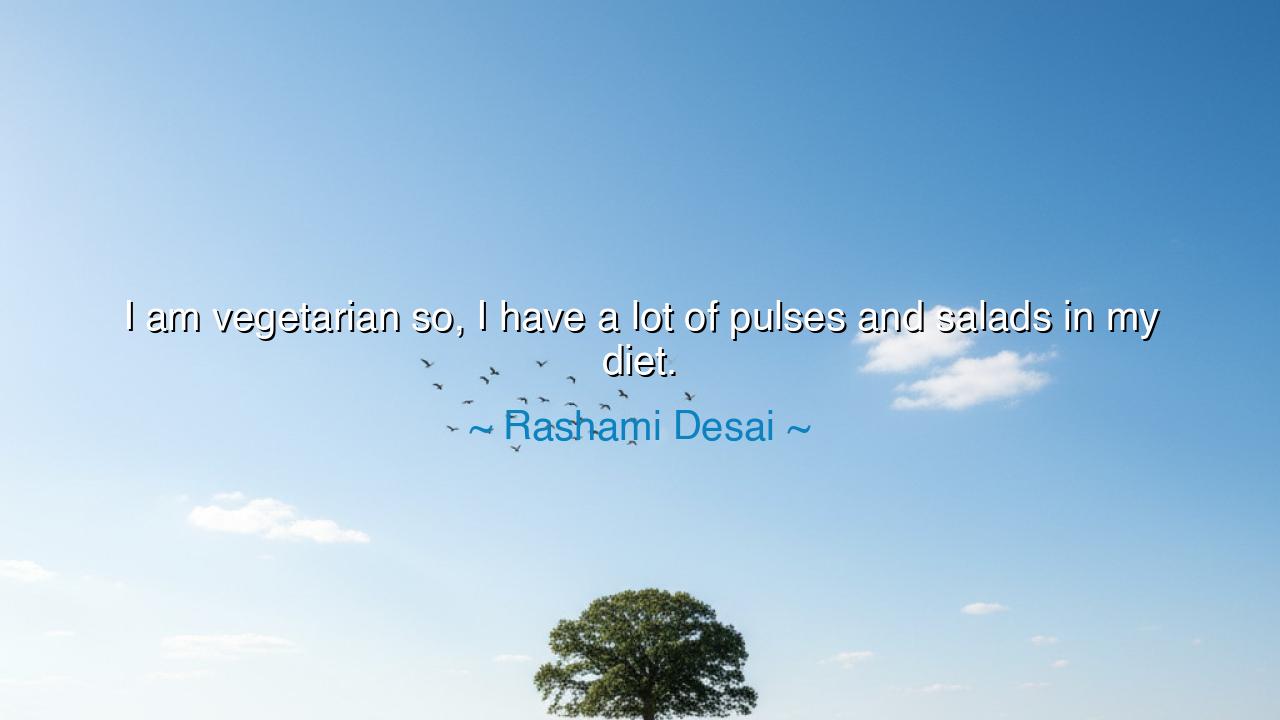
I am vegetarian so, I have a lot of pulses and salads in my diet.






When Rashami Desai said, “I am vegetarian, so I have a lot of pulses and salads in my diet,” she was not merely describing a menu — she was describing a way of life. Within her words rests an ancient echo: the call to live in harmony with one’s body, one’s conscience, and the world that sustains it. Her simple declaration reflects the wisdom of centuries — the understanding that what we consume becomes not only the substance of our flesh but the reflection of our spirit. To choose a vegetarian path, rich in the quiet strength of plants and pulses, is to choose a life of balance — one that nourishes without harm, one that sustains without greed.
The origin of this wisdom lies deep in the traditions of the East, where food was never seen as mere sustenance, but as sacred energy — prana, the breath of life. The great teachers of old — the rishis, the Buddhas, and the sages — taught that food carries vibration, that what grows in sunlight and soil carries within it the rhythm of the earth. When Rashami speaks of pulses and salads, she is, perhaps without knowing, echoing this eternal truth. The lentil, humble and earthy, represents endurance and simplicity. The salad, crisp and alive, represents freshness of mind and renewal of life. Together, they symbolize the union of strength and serenity — the very essence of a soul at peace.
In the world of the ancients, kings and warriors were judged not only by their power, but by their discipline at the table. The Emperor Ashoka, after his great conquest, renounced meat and violence together, realizing that mastery over others meant little without mastery over self. His transformation — from conqueror to enlightened ruler — began with what he chose to eat. In his restraint was his rebirth. Rashami’s simple words mirror this same understanding: that the act of eating is never small. Each bite is a choice — between harmony and excess, between awareness and forgetfulness.
Yet her quote also speaks to modern courage — the courage to maintain gentleness in a world of indulgence. To be vegetarian today is to stand apart from the noise of craving and convenience. It is to walk the slower, quieter path of mindfulness. Rashami’s preference for pulses and greens shows not denial, but devotion — devotion to well-being, to compassion, and to self-respect. For the ancients believed that to eat cleanly was to think clearly; that purity of diet leads to purity of mind, and purity of mind to purity of action.
In her lifestyle, we see also the eternal lesson of simplicity. For health and happiness do not require luxury, but consistency and consciousness. The pulse, often dismissed as poor man’s food, is in truth the food of endurance — rich in quiet strength. The salad, untouched by fire, is a reminder that not all nourishment requires transformation; some goodness is best received in its natural form. In this, Rashami’s diet becomes a metaphor for life itself: to take only what is needed, to honor what is pure, to live without excess, and to remain grateful for what sustains you.
Consider also the spiritual undertone of her vegetarianism — the refusal to consume life for pleasure. The Vedas call this ahimsa, the principle of non-violence. It teaches that when we live gently, the world responds in kind. The one who eats without harm walks in peace; the one who consumes thoughtlessly breeds unrest within. Through her diet, Rashami participates in this lineage of compassion — not loudly, not ideologically, but naturally, through her choices each day.
And so, my children of appetite and ambition, let her words remind you: your diet is not only what you eat, but what you choose to honor. To eat well is to live wisely. Fill your plate not with excess, but with balance — with foods that strengthen, not dull; that calm, not inflame. Let your meals be acts of gratitude, your nourishment a reflection of respect for life. As Rashami Desai teaches in her quiet way, there is power in simplicity, beauty in restraint, and divinity in the act of eating with awareness. The one who honors their food honors their soul — and in that harmony, finds both health and peace.






AAdministratorAdministrator
Welcome, honored guests. Please leave a comment, we will respond soon